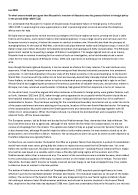On the other hand, it could be argued that other instances in Mussolini’s foreign policy were greater failures, such as Corfu. Between 1922 and 1935, Italian foreign policy appeared to be successful whilst Mussolini acted like an international statesman, but Corfu is an exception. In August 1923 an Italian general and four of his staff were assassinated in Greece. They had been working for the international boundary commission set up under the terms of the peace settlement and were advising on the precise, location of the new Greek-Albanian border. On hearing of the assassinations Mussolini blamed the Greek government and demanded a full apology together with 50 million lire in compensation. When the Greeks refused, he ordered the bombardment and occupation of the island of Corfu, off the Greek mainland.
The European powers, led by Britain and backed by her Mediterranean fleet, demanded that Italy withdraw. The Duce had little choice but to agree and, although he did receive the 50 million lire compensation, he did not receive a full apology from the Greeks. The episode was hailed in Italy as a great success for dynamic Fascism, but it also showed that, although Mussolini might be able to bully smaller powers, he was unable to stand up to the great powers, and is therefore a failure. However, the consequences were not quite as severe as with Abyssinia so therefore Abyssinia was a greater failure.
Furthermore, we could consider the Spanish Civil War as a greater failure than Abyssinia. A period of consolidation would have made most sense, giving Italy the chance to replace losses caused by the Ethiopian war. Yet, even before the conflict was over, Mussolini had made another commitment – assisting Franco’s National Front. Italian intervention was based on a sensible wish to have a friendly right wing regime at the western end of the Mediterranean rather than a communist one. The extent of the commitment was a mistake because, when added to the continuing occupation of Ethiopia, it proved a strain on the Italian economy and its military. The war bled Italy white. Germany didn't become so heavily involved and was happy to see Italy entangled there, thus unable to take too close an interest in German policies.
The defeat of Italian forces at the battle of Guadalajara (March, 1937) acquired special significance as it was inflicted in part by the Garibaldi battalion of Italian anti-fascists. This indicated weakness on the part of the Italian military. The outcome of the Spanish Civil War was very disappointing: the new fascist regime installed in Spain did nothing to advance Italy's Mediterranean ambitions and refused to become involved in the Second World War, despite the fact that Italy had deployed 7,000 men. Spain was undeniably a failure for Mussolini, but this was because Italy had already been weakened by Abyssinia. Therefore the argument that Abyssinia was the greatest failure still stands.
Finally, the invasion of Abyssinia led to the intervention of the League of Nations which pushed Mussolini towards closer links with Hitler between 1936 and 1939. It could be argued that Mussolini’s closer links with Hitler after 1936 were a failure as this allowed Germany to take Austria in 1938, a country whose independence Mussolini had promised to defend in 1934. In Mar 1938, with a bare minimum of notice to Mussolini, Germany invaded Austria and swiftly incorporated the state into a greater Germany. Despite his earlier assurances to the Italian people Mussolini took no action to prevent or reverse this. Hitler was grateful, but Austria’s fate aroused intense frustration and anger in Italy and public discontent was great.
Cordial relations with Hitler were restored less than 2 months later after Hitler visited Italy, so that during the crisis over Czechoslovakia in the summer of 1938 Mussolini convinced himself that the real challenge facing Italy came not from Germany but from British naval domination of the Med. Italy, exhausted by its commitments in Ethiopia and Spain, could do little but accept its new ally’s expansion southwards. A powerful Germany with a frontier bordering Italy’s German-speaking provinces was a high price to pay for adventures elsewhere. It made Mussolini increasingly dependent upon German goodwill.
The Pact of Steel was singed in May 1939. It may have been intended to promote Mussolini’s ambitions in Africa and the Mediterranean but it also threatened to trap a militarily unprepared Italy into supporting German expansionist plans in northern Europe. With the collapse of the Stresa Front Mussolini became more isolated he was forced to turn towards Germany for increased help and support by 1939. This alliance would prove disastrous in the Second World War, suggesting that Mussolini’s closer relations with Hitler were a foreign policy failure.
In conclusion, I believe Mussolini’s invasion of Abyssinia was his greatest failure in foreign policy in the period 1922–1939 because it was the catalyst event that led to all his other failures during this period, such as the Spanish War and his relations with Germany.








